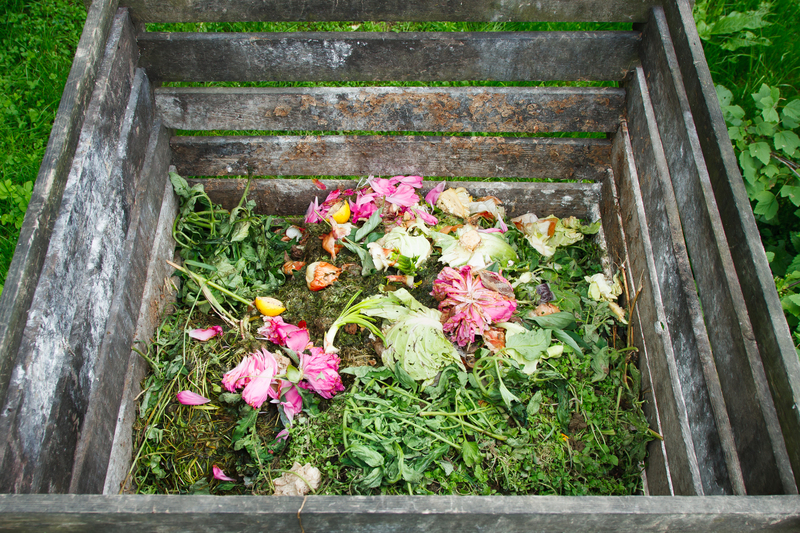Posted on 23/08/2024
Trash overflow is a common problem that many households and businesses face. It not only creates an unpleasant visual, but it also poses health and environmental hazards. Improperly handled bins can lead to the spread of diseases and pollute our surroundings. If you have been struggling with overflowing trash, worry no more! In this article, we will discuss ways to effectively handle unemptied bins and keep your space clean and hygienic.
The Causes of Unemptied Bins
Before we dive into the solutions, it is essential to understand the root cause of unemptied bins. One of the main reasons is inadequate waste management systems. Many cities and towns lack proper waste collection and disposal facilities, resulting in delays in garbage pickup. Another factor is inadequate bin capacity. Sometimes, the amount of trash generated exceeds the bin's capacity, leading to overflowing bins.

Effective Ways to Handle Unemptied Bins
1. Separate Your Waste: Proper segregation of waste can help reduce the amount of garbage that goes into your main bin. Differentiate between organic and non-organic waste, recyclable and non-recyclable materials, and dispose of them accordingly.
2. Compost Your Food Scraps: Instead of throwing food scraps in the bin, consider composting them for later use as fertilizers for your garden. This will not only reduce the volume of waste in your bins but also benefit your plants.
3. Consider Using Biodegradable Trash Bags: Traditional plastic bags take hundreds of years to decompose, contributing to landfill pollution. By using biodegradable trash bags, you not only reduce plastic waste but also ensure a cleaner environment for future generations.
4. Install Larger or Additional Bins: If you find that your current bin's capacity is not enough to accommodate all your waste, consider installing a larger bin or adding another one. This will help prevent overflow and also provide a larger space for waste segregation.
5. Schedule Regular Bin Pickups: If you live in an area with unreliable waste management services, it is crucial to have a schedule for bin pickups. This will ensure that your bins are emptied regularly, minimizing the chances of overflow.
6. Clean Your Bins Regularly: Cleaning your bins regularly can help prevent foul odors and pest infestations. Use a mixture of water and vinegar to disinfect the bin and let it air dry before using it again.
The Pros and Cons
Pros:
- Proper handling of unemptied bins results in a cleaner and healthier environment.
- Segregation of waste can reduce landfill pollution and promote recycling.
- Composting food scraps reduces the amount of waste in landfills, which produces harmful gases.
- Installing larger or additional bins can accommodate more waste, reducing the chances of overflow.
- Regular cleaning of bins prevents odors and pest infestations.
Cons:
- Some areas may not have reliable waste management services, making it challenging to handle unemptied bins effectively.
- Larger or additional bins may require extra space and incur additional costs.
- Composting food scraps takes time and effort, which may discourage some people from doing so.
Tips for Effective Waste Management
1. Educate Yourself: Stay informed about proper waste management practices in your area to ensure that you are doing your part to protect the environment.
2. Reduce, Reuse, Recycle: Always follow the mantra of "reduce, reuse, recycle" when it comes to handling waste. This will not only benefit the environment but also save you money in the long run.
3. Use Eco-Friendly Products: Invest in products made from sustainable materials that can easily decompose without polluting the environment.
4. Donate or Sell Unwanted Items: Instead of throwing away items you no longer need, consider donating or selling them. This will not only reduce waste but also help those in need.

Takeaways
Unemptied bins are a common problem, but with proper handling and management techniques, it can be easily prevented. Segregating waste, composting food scraps, scheduling regular bin pickups, and cleaning bins regularly are some effective ways to handle unemptied bins. By practicing these methods, we can create a cleaner and healthier environment for ourselves and future generations.
Conclusion
No more trash overflow! By following the tips mentioned above, you can effectively manage your waste and prevent overflowing bins. Let us all do our part in protecting the environment by properly handling and disposing of our waste. Small changes in our habits can make a significant impact in creating a sustainable and clean world. Start today and see the difference it makes.
Latest Posts
Tips for Proper Disposal of Regular Waste
Garbage Cleanup Bags - Efficient Skip Substitute

































 Get a Quote
Get a Quote